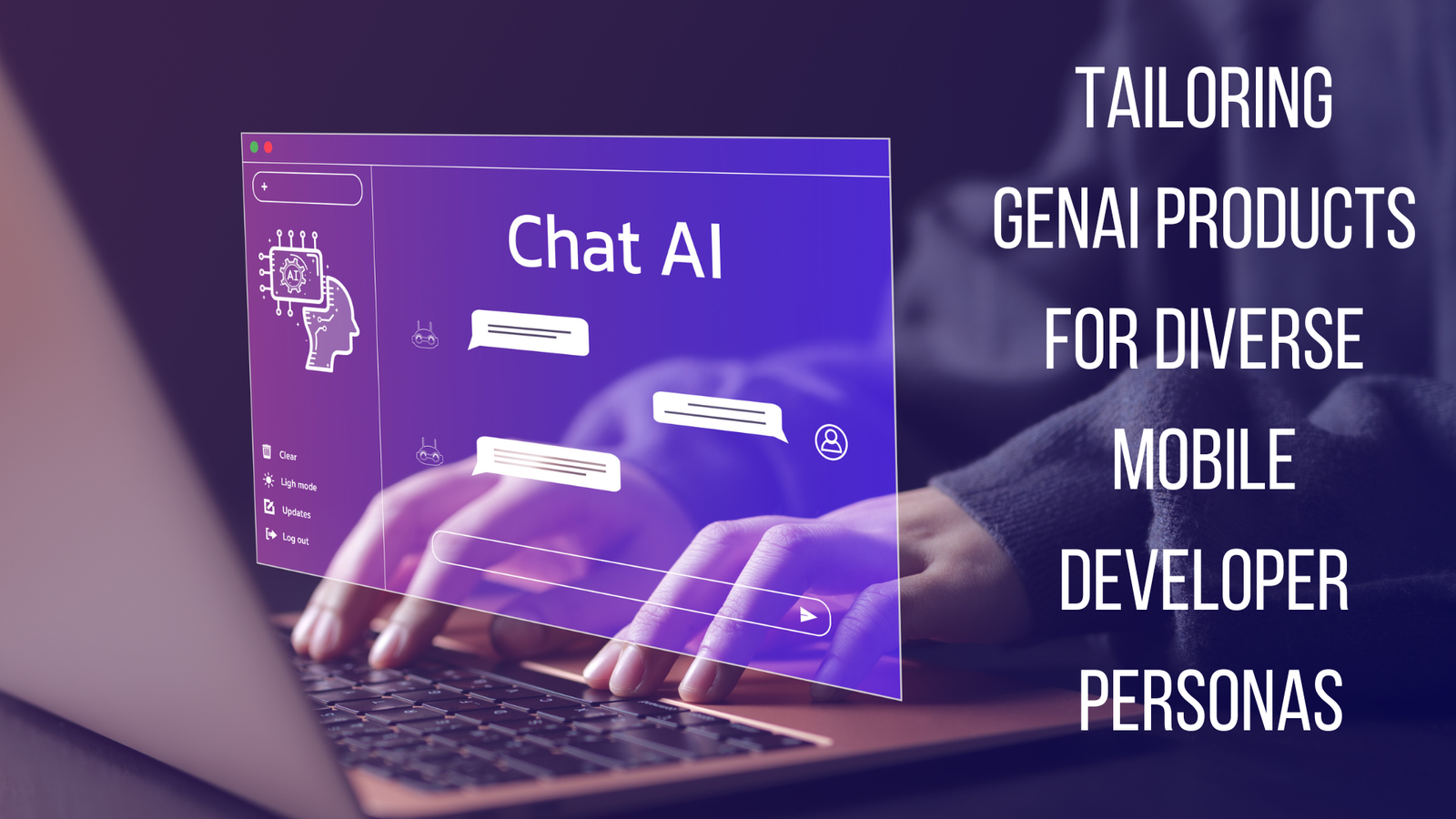In the evolving landscape of mobile development, Generative AI (GenAI) is changing the game by making it easier to create, test, and optimize apps. However, mobile developers are not a homogenous group; they range from novice developers to enterprise-level professionals, each with unique needs. Tailoring GenAI products to cater to these diverse personas not only enhances usability but also maximizes productivity and developer satisfaction.
Identifying Key Mobile Developer Personas
- Novice Developers: Typically new to mobile development, these developers benefit from simplified GenAI interfaces with built-in tutorials, real-time feedback, and learning resources. Tailored GenAI tools for beginners can focus on interactive, guided experiences to boost confidence and accelerate learning.
- Intermediate Developers: With more experience, intermediate developers value tools that can automate repetitive tasks, offer optimization suggestions, and streamline workflows. For instance, AI-based code refactoring and performance analysis tools can help them polish their coding practices.
- Expert Developers: Experts, often leading teams or handling complex projects, require advanced customization, precision, and scalability. GenAI tools that enable high customization, integrate deeply with preferred libraries, and allow for advanced features, like real-time code analysis, can enhance their productivity and maintain high standards.
- Indie Developers: Working independently or in small teams, indie developers need GenAI tools that help them cover multiple roles efficiently, from development to UI/UX design. Cost-effective, end-to-end GenAI solutions that support rapid prototyping and deployment can empower indie developers to innovate without extensive resources.
- Enterprise Developers: Handling large-scale applications, enterprise developers need GenAI tools that emphasize security, compliance, and scalability. Tailored AI for this persona includes robust collaboration features and compliance checks, making it easier to manage complex projects within enterprise frameworks.
Customizing GenAI Features for Each Persona
- UI Customization: Different skill levels require distinct UI experiences. Novices benefit from a simplified, focused UI with prominent tutorials and fewer distractions, while experienced developers prefer a feature-rich, customizable interface. Tailored UIs ensure that every developer feels comfortable with their tools and can easily access features relevant to their expertise.
- Machine Learning for Personalization: Leveraging machine learning, GenAI can analyze developers’ habits and adapt to their preferences, offering personalized code suggestions and debugging tips. For beginners, this could mean highlighting best practices, whereas, for experts, it could offer performance optimization suggestions and complex refactoring options.
- Platform-Specific Optimization: With various mobile platforms (iOS, Android, or cross-platform frameworks like Flutter and React Native), GenAI must support and optimize for the specifics of each ecosystem. Features like cross-platform code refactoring and language-specific insights can help developers create more efficient, versatile applications across different environments.
Key Challenges in Tailoring GenAI for Diverse Personas
- Addressing Skill Gaps: Each developer persona comes with its own set of knowledge and limitations. Beginners might struggle with complex coding practices, while experts demand tools that won’t interrupt their flow. Effective GenAI tools must balance simplicity with sophistication, ensuring that everyone can leverage AI without feeling overwhelmed or restricted.
- Maintaining Cross-Platform Compatibility: For cross-platform developers, seamless operation across both iOS and Android ecosystems is critical. GenAI tools must facilitate code that translates well between platforms and suggest optimizations that respect each platform’s nuances.
- Ensuring Privacy and Security: Particularly important for enterprise developers, GenAI products must prioritize secure handling of data and integrate compliance measures. This can involve encryption, role-based access, and regular security audits to keep development compliant with industry standards.
Implementation Best Practices for Tailored GenAI Solutions
- User Feedback Loops: Engaging developers directly through feedback loops ensures GenAI tools remain relevant and effective. Continuous updates based on real-world feedback allow GenAI products to evolve alongside developer needs, addressing challenges before they impact productivity.
- Modular Feature Design: Modular AI features enable developers to toggle functionalities as per their project needs. This flexibility allows developers across various experience levels to use only the features that are beneficial to their current task, increasing efficiency and reducing unnecessary complexity.
- Integrations with Popular Development Tools: GenAI tools must seamlessly integrate with platforms like Xcode, Android Studio, and popular libraries to enhance workflow. Integration ensures that developers can access GenAI benefits without switching tools, helping to keep focus and reduce friction.
Measuring Success and Impact
To assess the effectiveness of tailored GenAI products, organizations can establish clear metrics, including developer satisfaction, time saved, and error reduction rates. Monitoring these metrics helps refine GenAI solutions and ensures they provide tangible value to developers. Additionally, conducting regular surveys and feedback sessions provides qualitative insights, guiding the evolution of GenAI features to better serve each developer persona.
Future Outlook
The future of GenAI in mobile development promises further personalization and enhanced collaboration. Emerging trends like AI-powered AR/VR development, deeper integration with version control systems, and natural language programming are set to reshape mobile app creation, making GenAI an invaluable asset across developer personas. As AI capabilities expand, the ability to cater to diverse mobile developer needs will be integral to fostering innovation, productivity, and satisfaction in the development community.
Conclusion
Tailoring GenAI products for diverse mobile developer personas is essential for maximizing productivity, satisfaction, and user engagement in mobile app development. By understanding each persona’s unique challenges, skill levels, and goals, GenAI solutions can empower developers to work more efficiently, effectively, and creatively. As mobile technology continues to advance, the role of GenAI in delivering personalized, adaptive support will only grow, creating a future where every developer can excel with AI-driven assistance.

